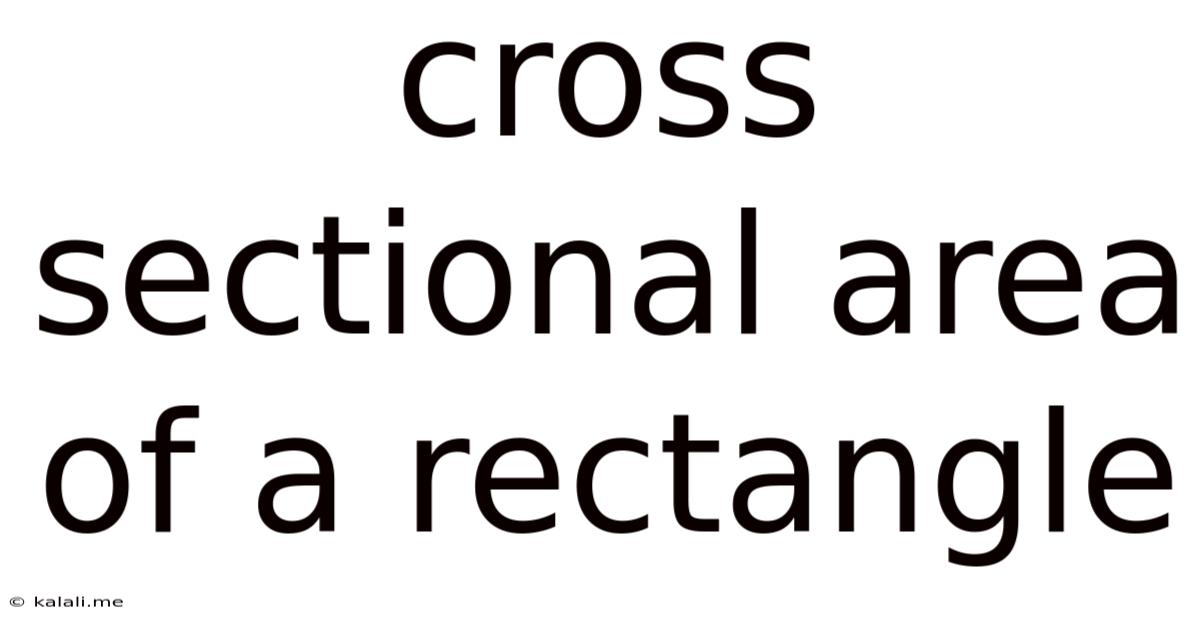Cross Sectional Area Of A Rectangle
Kalali
Jun 11, 2025 · 3 min read

Table of Contents
Understanding the Cross-Sectional Area of a Rectangle: A Comprehensive Guide
Meta Description: This guide provides a clear and comprehensive explanation of how to calculate the cross-sectional area of a rectangle, including formulas, examples, and practical applications. Learn everything you need to know about this fundamental geometric concept.
The cross-sectional area of a rectangle is a fundamental concept in various fields, from engineering and architecture to physics and materials science. Understanding how to calculate it is crucial for many practical applications, such as determining the strength of a beam, the flow rate of a fluid through a channel, or the heat transfer through a wall. This guide will break down the concept, providing you with the knowledge and tools you need.
What is Cross-Sectional Area?
The cross-sectional area refers to the area of a two-dimensional shape that is obtained when a three-dimensional object is sliced perpendicularly to its longest axis. Imagine cutting a rectangular prism (like a brick) straight across – the resulting face is a rectangle, and its area is the cross-sectional area. For a rectangle itself (a 2D shape), the cross-sectional area is simply its area.
Calculating the Cross-Sectional Area of a Rectangle
Calculating the cross-sectional area of a rectangle is straightforward. It's simply the product of its length and width.
Formula:
Area = Length × Width
Where:
- Area: Represents the cross-sectional area (often denoted as A).
- Length: Represents the length of the rectangle (often denoted as l or L).
- Width: Represents the width of the rectangle (often denoted as w or W).
Units: The units of the cross-sectional area are the square of the length units used for the length and width. For example, if length and width are measured in meters (m), the area will be in square meters (m²). Similarly, if measurements are in centimeters (cm), the area will be in square centimeters (cm²), and so on.
Examples
Let's look at a few examples to solidify our understanding:
Example 1:
A rectangular beam has a length of 10 cm and a width of 5 cm. What is its cross-sectional area?
Area = Length × Width = 10 cm × 5 cm = 50 cm²
Example 2:
A rectangular duct has dimensions of 2 meters and 1.5 meters. Calculate its cross-sectional area.
Area = Length × Width = 2 m × 1.5 m = 3 m²
Practical Applications
The cross-sectional area of a rectangle has numerous real-world applications:
- Structural Engineering: Determining the strength and stability of beams, columns, and other structural elements. A larger cross-sectional area generally indicates greater strength.
- Fluid Mechanics: Calculating flow rates in pipes and channels. The cross-sectional area affects the speed and volume of fluid flow.
- Heat Transfer: Calculating heat transfer rates through walls and other surfaces. A larger cross-sectional area can lead to increased heat transfer.
- Electrical Engineering: Determining the current carrying capacity of conductors. A larger cross-sectional area reduces resistance and allows for higher currents.
- Material Science: Analyzing the properties of materials based on their cross-sectional dimensions and shapes.
Beyond Rectangles: Understanding Other Shapes
While this article focuses on rectangles, it's important to note that calculating cross-sectional areas extends to other shapes as well. Circles, triangles, and other polygons all have their own formulas for calculating area, which are essential in various engineering and scientific contexts. Understanding these variations builds upon the fundamental principles discussed here.
By understanding the calculation and applications of the cross-sectional area of a rectangle, you gain a foundational understanding of a crucial concept in various scientific and engineering disciplines. This knowledge allows for effective problem-solving and a deeper appreciation for the geometry that shapes our world.
Latest Posts
Latest Posts
-
How Many Slices Of Turkey In 2 Oz
Jul 01, 2025
-
Omnipoint Miami E License Llc Miami Fl
Jul 01, 2025
-
Mi Familia Fuera La M S Grande Correct Incorrect
Jul 01, 2025
-
How Much Is 20 Pounds Of Pennies Worth
Jul 01, 2025
-
How Much Does A Gallon Oil Weigh
Jul 01, 2025
Related Post
Thank you for visiting our website which covers about Cross Sectional Area Of A Rectangle . We hope the information provided has been useful to you. Feel free to contact us if you have any questions or need further assistance. See you next time and don't miss to bookmark.